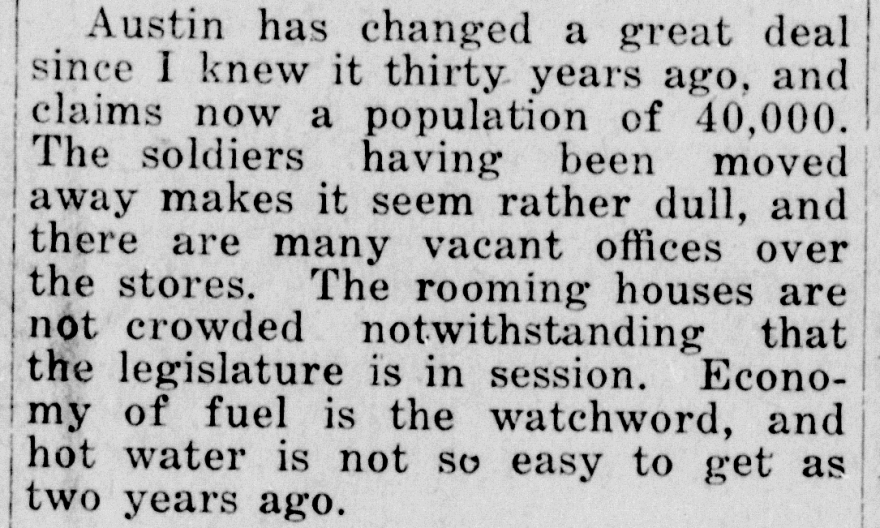Austin has a well-known tendency to wax nostalgic about the past — but “the past” often seems like a moving target. Ask around, and you’ll get different answers for when “Old Austin” actually was.
“The old joke is, ‘Austin was great 10 minutes before you arrived,’” said Randy Lewis, chair of the American Studies Department at UT Austin. “You could say that to someone in 1970, 1980, now. And the spirit's the same, like, ‘Oh, you just missed the Golden Age.’”
Lewis first came to Austin as a UT undergrad in the ‘80s. He left when he was 25 before returning in 2009 as a professor.

He has enough years in the city to claim “Old Austin.” Or at least one version of it.
“I got here in 1985, and it was like everybody was in a band or they were writing plays … and you could live in Hyde Park and get a nice room like I did for $200 a month,” he said. “People went to UT for 10 years just because they liked taking classes, because it was so cheap and Austin was so cheap.”
I don’t have that kind of history. I’m a newcomer — a year and a half and counting — but even a newcomer can sense people’s longing for the way Austin used to be.

What makes Austinites so nostalgic, and how long has the city been this way? For answers, I reached out to Lewis, who’s also the founder of The End of Austin, a blog that has chronicled Austin’s changing landscape and culture since 2011. I also looked through the newspapers of years past to see what people had to say.

Lewis has a couple different theories on why Austinites seem particularly sentimental. The first is simple: Lots of people came when they were young, and some of the nostalgia is just the bittersweet feeling of growing into adulthood.
“I think it's a lot to do with the university — people coming of age here, being 18 when they show up, also coming from maybe a small town in Texas. And you find that Austin is this exciting, more cosmopolitan place,” he said. “That kind of bond is really intense.”


Over the course of a lifetime, things inevitably change. But that’s not the whole story in Austin.
The city hasn’t just changed — it’s changed fast, especially in the past two decades, Lewis said. From 2000 to 2022, the population of the Austin-Round Rock area nearly doubled from 1.27 million to 2.42 million, according to the U.S. Census Bureau. For comparison, the total U.S. population grew by about 18% in the same time period.
With population growth comes development. New homes, restaurants and stores replace old ones. Local businesses and longtime residents get priced out.
That leads us to another culprit: the pro-growth, pro-change force of capitalism.
“Capitalism has changed Austin in this really fast way, and a lot of people have been standing on the sidelines watching, feeling disempowered or disenfranchised from the real decisions about the way the neighborhood is going to look,” Lewis said. “You don't get to choose.”
Nostalgia is a way for people to process that feeling of losing control.

But of course, people have been missing “Old Austin” for longer than the past 20 years.
“People told me that when I got here,” Lewis said. “I was 18 and they were like, ‘Oh, Austin was so great. It was so much better in 1970.’”
So, at least part of it is timeless. Maybe nostalgia is embedded in Austin’s personality as much as Barton Springs, live music or “keeping it weird.” (Ironically, that slogan has been around since only 2000.)
“That's part of the Austin story, I think, is to imagine that something beautiful just happened, and now we're squandering it,” Lewis said.

I asked Lewis whether he thinks nostalgia is useful for Austinites. Does it help or hurt people to constantly look back on the past?
“It is a form of grief,” he said. “It's also sort of a bonding thing, too.”


But there’s danger in romanticizing the past too much. Not everyone would agree things were better in “the good ol’ days,” and the further back you go, the dicier that concept gets.
“A lot of the Golden Age stuff is really also highly racialized,” Lewis said. “Austin was not a great place in 1968 to be a person of color or to be queer.”
In the end, he didn’t have a straightforward answer about what nostalgia does for us.
Just another question.
“Is it a good thing to carry that around?”
What era of Austin do you miss? Tell us in the form below. If you don't see a form, try refreshing the page.








